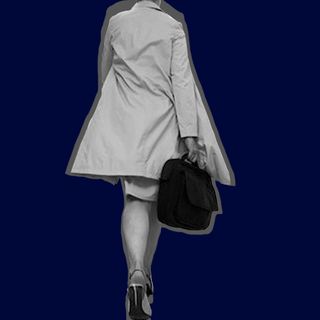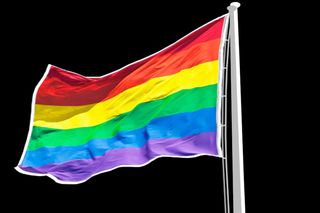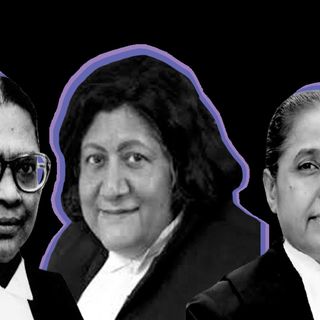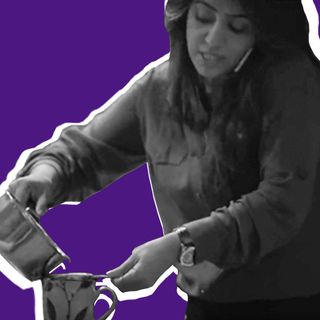
Watching Section 377: The Partners
The first in a three-part series exploring what LGBTQ+ people and their families are feeling as they watch Supreme Court deliberations.

Last month, the Supreme Court began hearing petitions to repeal Section 377 of the Indian Penal Code, which criminalizes “carnal intercourse against the order of nature,” which has traditionally been interpreted to include sexual relations between persons of same sex. The bench, headed by Chief Justice Dipak Misra, has raised hopes; one of its members, Justice DY Chandrachud, linked the rights of LGBTQ+ individuals to the decision that established privacy as a fundamental right in January.
We spoke with several young adults, as well as the parent of one, about what it’s like to grow up gay in India, and how repealing Section 377 would affect their lives. The first in this three-part series features a young couple from Mumbai. The interview has been edited for length and clarity.
The Partners
THE SWADDLE: Has Section 377 ever affected the way you lead your life?
Debendra Nath Sanyal, 27: I think for the both of us, we were very fortunate that it did not. But I’ve had friends who have been blackmailed and taken advantage of because of Section 377.
When I was interviewing for my current job. My boss was like, “You’ll settle down and, in a couple of years, you’ll get married.” So, I told him I can’t get married in this country. And he asked why. So, I said, “It’s because I’m gay and it’s not legal over here to get married yet.”
He was like, “Oh, you’re gay, but isn’t that illegal?” So, I had to tell him, that, no sir, being gay is not illegal, having gay sex is illegal. More so, having any kind of sex which is not vaginal is illegal. So, he was taken aback, and he was like, “Okay, I did not know about this.” So, you know … because of Section 377, people think that all LGBT people are criminals.
THE SWADDLE: Has Section 377 affected the way you feel about yourself?
Deb: Actually, it never did. I never gave it so much importance.
Ankit Andurlekar, 25: There is no awareness. When actually Delhi High Court has chopped down 377 [in 2009], I was not even aware about that there is some law. Section 377 is at a very higher level for people to comprehend. So if [repeal] happens, it will be a domino effect, then there will be lots of other things which will happen – same-sex marriage will be accepted. That will ultimately affect people’s mindset. They will understand that there is an existence of certain people, that there are people who have different sexuality, there are people who have different identity. That will happen by [repealing] Section 377. Right now, people are still under darkness knowing nothing, and [not aware of] the suffering LBGT people are having.
THE SWADDLE: Can you give an example of people being under darkness? Of being unaware?
Deb: [When I came out] my dad just couldn’t understand the concept of being gay. He did not know what gay was. For him gay men were the exaggerated, colourful men he saw on media or movies or films or shows. Or they were people who would touch each other inappropriately just because they wanted to touch each other. He didn’t understand that gay men can be as normal as a straight man, and have a relationship. Now he does. He even makes conversations with Ankit, mostly, which is very funny, but he still does, he tries.
Ankit: When I was growing up I didn’t even know what gay was, until I was in college. Being gay or gay relationship, being in a relationship with a guy — I thought that was not possible.
There was zero information about sex or sexuality. My school was a Catholic school, and they used preach that homosexuality is a sin, and we were taught in that way. Our science teacher used to say that homosexuality within guys is sinful, and it’s not possible between girls. If he would have given a proper explanation about sex, sexuality and gender I would have accepted myself before that. I didn’t have to struggle for 23 years.
[When I came out] my dad also started crying, my granny joined in and she was holding herself, like as if she was about to get a heart attack. I was like, “What am I doing? What’s happening in my house?” And everything was very chaotic, and I’m still trying to explain to them that, see, this is nothing more than love, and I am a bit different from others, and I knew this from childhood, this struggle between me for these 23 years. I couldn’t understand what I wanted, and now I’ve come to terms with it, I need your help to move ahead in my life, if you guys are not there it will be more difficult for me; it has been difficult for me.
It was very difficult for them to understand and it was difficult for me to explain — that it’s not about this one guy I met few months back. It’s about the 23 years of struggle I had, and the 23 years of love I have for you.
Now they love Deb, they call Deb as babu babu, and they pamper him more than what they do to me now. Everyday I call them. Every weekend I visit them. So, things are moving in a right direction now. They are not as vocal or as accepting as Deb’s mother is. But then, I guess there will be a point where they will also be like that.
THE SWADDLE: How would repealing 377 affect you going forward?
Ankit: For 23 years I was thinking that I would never find love, but then, luckily, I found Deb. He was the first guy I had ever seen who’s out and open and so confident about himself, and I just fell in love with him in the first sight. So, we plan to go out and get married. So probably after Section 377 [being repealed], in a few years, same-sex marriage will also be legal in India.
Deb: We’ll keep continuing to live as we are. With or without [changes to] 377. It’s just that if it is taken down, there are a lot of civil rights that we will get, you know, basic things, like health insurance, which straight individuals get without any effort. [Right now] we can’t have a joint bank account, we can’t have insurances on each other. My insurance money would never go to him. We don’t have any construct of marriage, family. 377 would be the first step and then there would be a lot of steps in civil reforms when it comes to LGBT rights.
Next in this series: The Parent.
Related


Only 27% of Judges in India’s Lower Courts are Women
